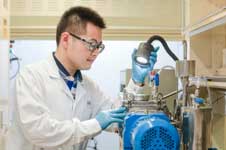Research: Wacker opens thermal interface materials centre in China; Radici sets up new company to focus on R&D

Munich-based chemical group Wacker has opened a global competence centre for thermal interface materials (TIMs) in Shanghai, China. The new laboratory is located at the company’s China headquarters in Caohejing High-Tech Park. It will conduct fundamental research in order to develop novel silicone-based thermal interface products and solutions for the electrical vehicle market as well as for consumer electronics and telecommunication industries.
Over the past decade, thermal interface materials (TIM) have been one of the fastest growing segments of the materials market globally, with an average compound annual growth rate of more than 6%. Widely used in personal computers, consumer electronics, automotive and telecommunication industries, the demand for silicone-based TIMs is expected to grow continuously, as power density is rising exponentially and thermal management systems become increasingly important.
Electronic devices and batteries generate a great deal of heat that impacts their functionality and service life and can lead to serious faults. Efficient thermal management is therefore increasingly essential. “For improved thermal management of components, the industry is increasingly turning to heat-dissipation materials”, says Christian Gimber, head of Engineering Silicones at Wacker’s silicone division. “Our thermally conductive silicones can be processed very efficiently, and they also meet the stringent and rising safety and reliability requirements imposed by the electronics and automotive industries.”
The company’s new R&D lab in Shanghai will focus on the development of silicone-based thermal interface materials and novel applications, Gimber emphasises. “
Located at Wacker’s Shanghai Centre in Caohejing High-Tech Park, the new centre shares existing resources such as analytics and the e-mobility lab of the site. Experts will conduct fundamental research aimed at overcoming technical hurdles with regard to performance, processability and cost-effectiveness and leverage Wacker’s proprietary technology to work on new material designs. The facility will develop customised products and solutions with locally available raw materials for the Chinese market, but also support other labs in the company’s worldwide network, such as labs in Germany and Korea, when creating new formulations.
The Chinese industry uses TIMs in a wide array of products.
Thanks to their unique properties, silicones are widely used for thermal management in the automotive, consumer electronics and telecommunication industries. Featuring excellent electrical insulation properties and a high degree of resistance against hot and cold temperatures, chemicals and UV radiation, silicone-based thermal interface materials are available as gap fillers, potting glues, adhesives, greases and foams for smartphones, telecommunication base stations, battery packs and power control unit modules for electric vehicles.

Meanwhile in other news, materials firm RadiciGroup has founded Radici InNova, a non-profit consortium, to carry out its development of new research and innovation projects for the chemical, high performance polymers and advanced textile solutions sectors, in accordance with its sustainability strategy.
The new company will take advantage of and improve the synergies of the R&D activities that have long been carried on by the RadiciGroup Specialty Chemicals, High Performance Polymers and Advanced Textile Solutions Business Areas.
“The formation of Radici InNova represents an important milestone for the whole Group on its path towards innovation, which was started many years ago,” Angelo Radici, President of RadiciGroup, said. “In fact, during the years, innovation has been a key element that distinguishes us and enables us to expand into a variety of sectors and supply the market with competitive, cutting-edge products and solutions. By sharing the know-how and the competencies of the various group business areas, it will be possible to develop integrated advanced research projects, in accordance with our sustainability strategy and inspired by the principles of environmental protection and the circular economy, ensuring constant growth and a better future for generations to come."
By leveraging internal competencies and targeted relationships with third parties, Radici InNova will manage and coordinate all the group’s essential research activities, with the objective of strengthening the role of innovation as a driver of RadiciGroup development. Furthermore, the new company will actively foster the continual improvement of products and processes, while optimising the use of resources and lowering the environmental impact of its activities.
(PRA)
Subscribe to Get the Latest Updates from PRA Please click here
©2020 Plastics and Rubber Asia. All rights reserved.

©2020 Plastics and Rubber Asia. All rights reserved.
Home Terms & Conditions Privacy Policy Webmail Site Map About Us






















